Module 9 Unit 2 Arnwickwas a city with 200,000 people课件(共24张PPT)
文档属性
| 名称 | Module 9 Unit 2 Arnwickwas a city with 200,000 people课件(共24张PPT) | 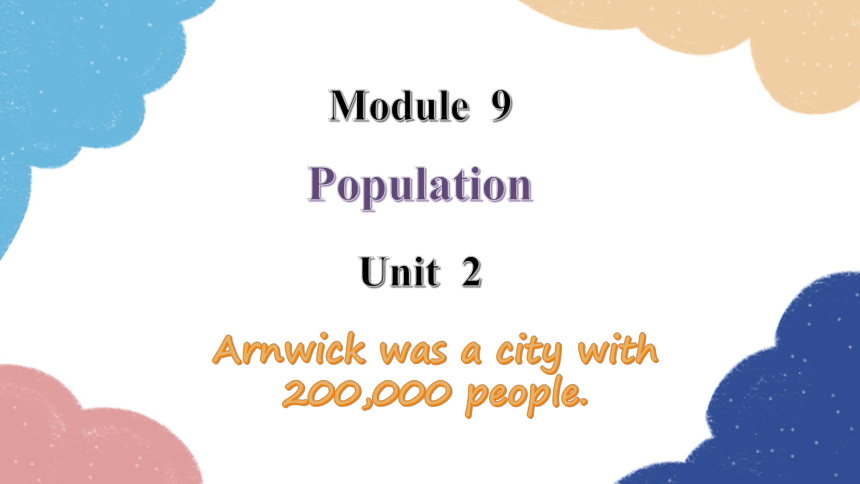 | |
| 格式 | pptx | ||
| 文件大小 | 2.8MB | ||
| 资源类型 | 教案 | ||
| 版本资源 | 外研版 | ||
| 科目 | 英语 | ||
| 更新时间 | 2022-10-05 16:12:27 | ||
图片预览

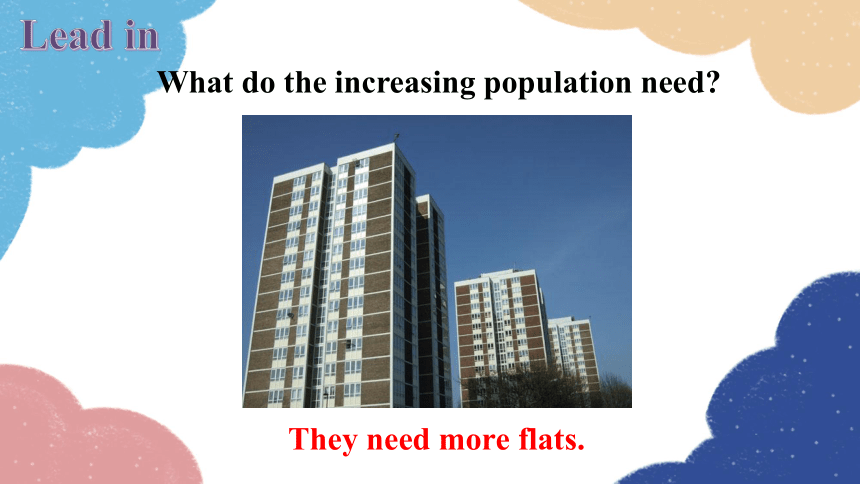
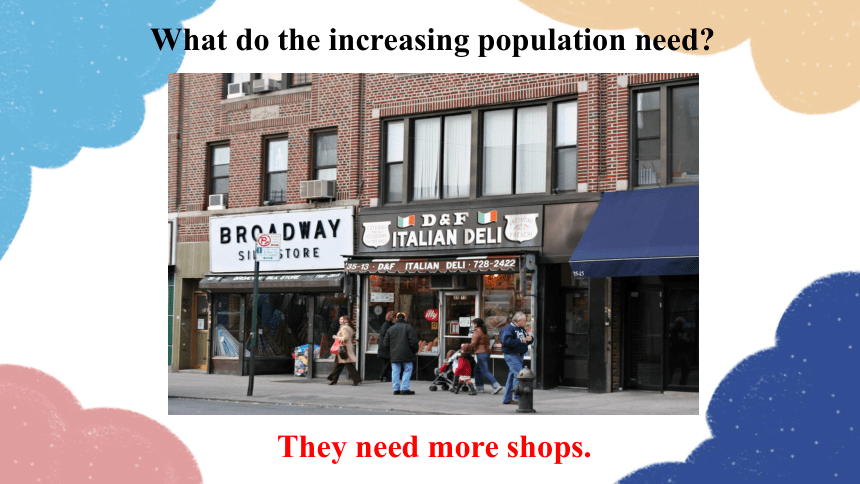

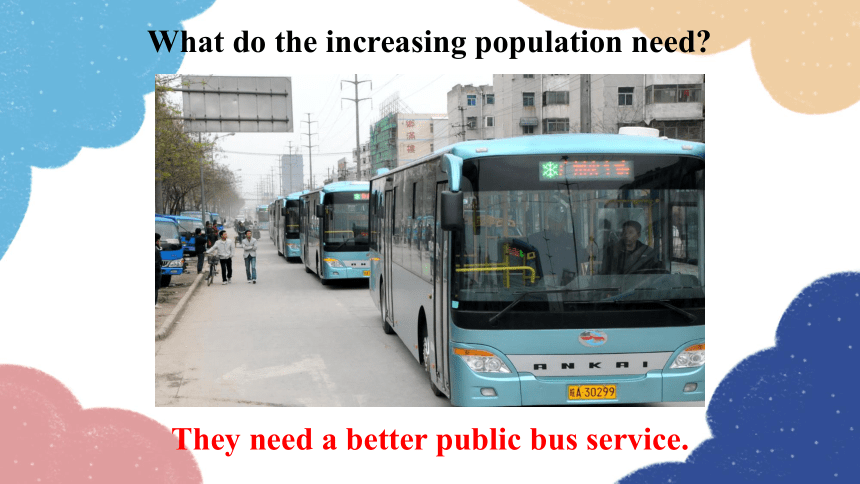
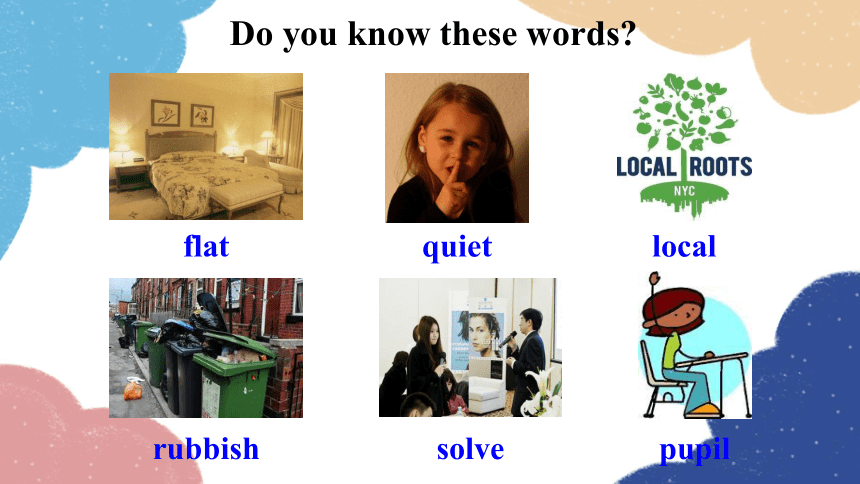

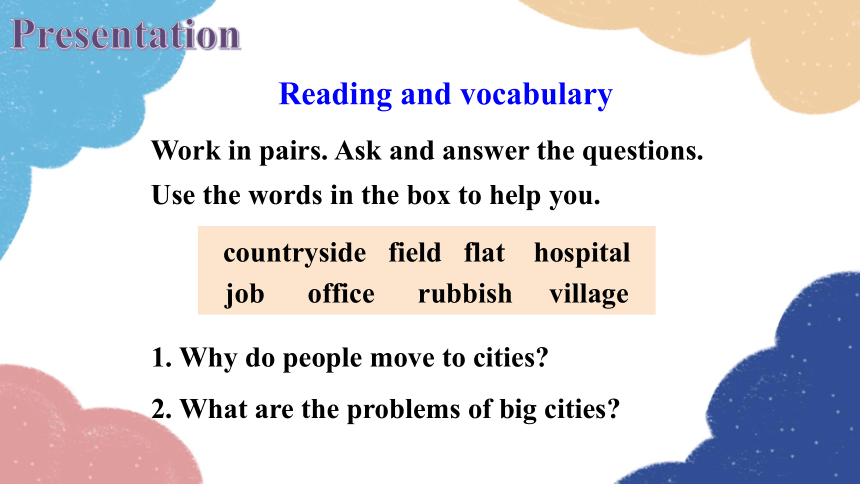
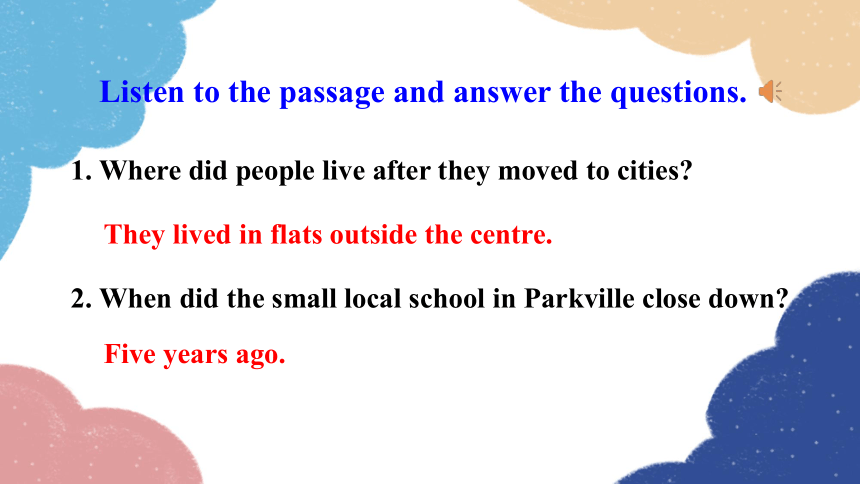
文档简介
(共24张PPT)
Unit 2
Population
Module 9
Arnwick was a city with 200,000 people.
What do the increasing population need
They need more flats.
Lead in
What do the increasing population need
They need more shops.
What do the increasing population need
They need more hospitals.
What do the increasing population need
They need a better public bus service.
Do you know these words
flat
quiet
local
rubbish
solve
pupil
pollution
public
service
Presentation
Reading and vocabulary
Work in pairs. Ask and answer the questions. Use the words in the box to help you.
countryside field flat hospital
job office rubbish village
1. Why do people move to cities
2. What are the problems of big cities
Listen to the passage and answer the questions.
1. Where did people live after they moved to cities
They lived in flats outside the centre.
2. When did the small local school in Parkville close down
Five years ago.
Read the passage and answer the questions.
1. How long will it take to go to school in Arnwick
An hour.
Yes, it was.
In one of those flats.
2. Where does Jo’s family live now
3. Was it expensive to live in the centre of the city
1. ..., so the government built flats outside the centre.
flats 表示“公寓,套房”
house 表示“房子”
2. It’s clear that Arnwick needs more schools, buses and hospitals.
It’s clear that … 表示“很清楚…...”。
eg. It’s clear that we need to work hard before the coming final exam.
很明显,我们要在即将到来的期末考试前努力学习。
重点单词短语
3. The small local school in Parkville closed down five years ago.
local adj. 当地的
close down 表示“(永久性地)停工,关闭”。
e.g. The company closed down last year.
去年那家公司关闭。
4. There is a lot of traffic and pollution.
pollution n. 污染
pollute v. 污染
e.g. Noise pollution is more serious in the city.
噪音污染是城市中更为严重的问题。
冠词的用法
冠词有三种形式:不定冠词 a(n), 定冠 the和零冠词。
一、不定冠词的用法。
首次提到某人某人, 不定冠词起介绍作用。
eg. I’m preparing some notes for a report.
我正在为一个报告准备笔记。
2. 表示“每一”的概念,相当于 every。
eg. I go to the cinema once a month.
我一个月去看一次电影。
3. 某些固定短语中,要用不定冠词。
eg. have a good time, in a hurry, have a break
二、定冠词的用法。
1. 指前面提到过的人或物,或特指某人或某物。
eg. I have a dog. The dog is brown.
2. 指谈话双方都知道的人或物。
eg. I had to write the same report last term!
3. 用于序数词以及形容词的最高级之前。
eg. He went to the first floor.
4. 用于世界上独一无二的事物。
eg. The sun is shining brightly.
5. 在江河、海洋、山脉等地理名词前及由普通名词构成的专有名词前。
eg. the Great Wall of China
6. 用于表示方位名词前。
eg. Guangdong is in the south of China.
7. 用在弹奏乐器中。
eg. The boy is playing the piano.
8. 在某些形容词前加定冠词,表示一类人或物。
eg. The old are dancing on the playground.
9. 在姓氏复数形式之前, 表示“一家人”或“夫妇两人”。
eg. The Browns are really a large family.
10. 用于某些固定短语中。
eg. by the way
三、零冠词。
1. 在球类活动、学科名称前,以及节日、月份、星期前不用冠词。
eg. 1st June is Children’s Day.
2. 名词前已有指示代词、物主代词、不定冠词或数词等作定语的
名词前不用冠词。
eg. I have several questions to ask.
3. 在某些固定词组和习惯用语中不用冠词。
eg. by bus at night in trouble
Practice
1. — Please make _____ for the old woman.
— Here you are.
A. house B. flat C. room
2. The paper factory _____ last year and the villagers were very happy to have a better life.
A. closed off B. closed away
C. closed down
C
C
3. Air ______ is a serious problem in big cities.
A. pollution B. pollute C. rubbish
4. The government needs to make ______ to protect the forest.
A. laws B. stories C. ways
A
A
中考链接
— Be careful ! There is ____ dog lying on the ground.
— Thanks a lot.
A. a B. an C. the D. /
2. There is no living thing on ______ moon.
A. the B. a C. 不填
A
A
3. Bill likes playing _____ basketball, but he doesn’t like playing _____ piano.
A. the, the B. /, the C. the, /
B
Summary
冠词的用法。
重点短语。
build flats in fact
close down public service
Homework
Write a passage to tell about the problems of your city.
Unit 2
Population
Module 9
Arnwick was a city with 200,000 people.
What do the increasing population need
They need more flats.
Lead in
What do the increasing population need
They need more shops.
What do the increasing population need
They need more hospitals.
What do the increasing population need
They need a better public bus service.
Do you know these words
flat
quiet
local
rubbish
solve
pupil
pollution
public
service
Presentation
Reading and vocabulary
Work in pairs. Ask and answer the questions. Use the words in the box to help you.
countryside field flat hospital
job office rubbish village
1. Why do people move to cities
2. What are the problems of big cities
Listen to the passage and answer the questions.
1. Where did people live after they moved to cities
They lived in flats outside the centre.
2. When did the small local school in Parkville close down
Five years ago.
Read the passage and answer the questions.
1. How long will it take to go to school in Arnwick
An hour.
Yes, it was.
In one of those flats.
2. Where does Jo’s family live now
3. Was it expensive to live in the centre of the city
1. ..., so the government built flats outside the centre.
flats 表示“公寓,套房”
house 表示“房子”
2. It’s clear that Arnwick needs more schools, buses and hospitals.
It’s clear that … 表示“很清楚…...”。
eg. It’s clear that we need to work hard before the coming final exam.
很明显,我们要在即将到来的期末考试前努力学习。
重点单词短语
3. The small local school in Parkville closed down five years ago.
local adj. 当地的
close down 表示“(永久性地)停工,关闭”。
e.g. The company closed down last year.
去年那家公司关闭。
4. There is a lot of traffic and pollution.
pollution n. 污染
pollute v. 污染
e.g. Noise pollution is more serious in the city.
噪音污染是城市中更为严重的问题。
冠词的用法
冠词有三种形式:不定冠词 a(n), 定冠 the和零冠词。
一、不定冠词的用法。
首次提到某人某人, 不定冠词起介绍作用。
eg. I’m preparing some notes for a report.
我正在为一个报告准备笔记。
2. 表示“每一”的概念,相当于 every。
eg. I go to the cinema once a month.
我一个月去看一次电影。
3. 某些固定短语中,要用不定冠词。
eg. have a good time, in a hurry, have a break
二、定冠词的用法。
1. 指前面提到过的人或物,或特指某人或某物。
eg. I have a dog. The dog is brown.
2. 指谈话双方都知道的人或物。
eg. I had to write the same report last term!
3. 用于序数词以及形容词的最高级之前。
eg. He went to the first floor.
4. 用于世界上独一无二的事物。
eg. The sun is shining brightly.
5. 在江河、海洋、山脉等地理名词前及由普通名词构成的专有名词前。
eg. the Great Wall of China
6. 用于表示方位名词前。
eg. Guangdong is in the south of China.
7. 用在弹奏乐器中。
eg. The boy is playing the piano.
8. 在某些形容词前加定冠词,表示一类人或物。
eg. The old are dancing on the playground.
9. 在姓氏复数形式之前, 表示“一家人”或“夫妇两人”。
eg. The Browns are really a large family.
10. 用于某些固定短语中。
eg. by the way
三、零冠词。
1. 在球类活动、学科名称前,以及节日、月份、星期前不用冠词。
eg. 1st June is Children’s Day.
2. 名词前已有指示代词、物主代词、不定冠词或数词等作定语的
名词前不用冠词。
eg. I have several questions to ask.
3. 在某些固定词组和习惯用语中不用冠词。
eg. by bus at night in trouble
Practice
1. — Please make _____ for the old woman.
— Here you are.
A. house B. flat C. room
2. The paper factory _____ last year and the villagers were very happy to have a better life.
A. closed off B. closed away
C. closed down
C
C
3. Air ______ is a serious problem in big cities.
A. pollution B. pollute C. rubbish
4. The government needs to make ______ to protect the forest.
A. laws B. stories C. ways
A
A
中考链接
— Be careful ! There is ____ dog lying on the ground.
— Thanks a lot.
A. a B. an C. the D. /
2. There is no living thing on ______ moon.
A. the B. a C. 不填
A
A
3. Bill likes playing _____ basketball, but he doesn’t like playing _____ piano.
A. the, the B. /, the C. the, /
B
Summary
冠词的用法。
重点短语。
build flats in fact
close down public service
Homework
Write a passage to tell about the problems of your city.
同课章节目录
- Module 1 How to learn English
- Unit 1 Let's try to speak English as much as possi
- Unit 2 You should smile at her.
- Unit 3 Language in use .
- Module 2 My home town and my country
- Unit 1 It's taller than many other buildings.
- Unit 2 Cambridge is a beautiful city in the east o
- Unit 3 Language in use .
- Module 3 Sports.
- Unit 1 Nothing is more exciting than playing tenni
- Unit 2 This year we training more carefully.
- Unit 3 Language in use .
- Module 4 Planes, ships and trains .
- Unit 1 He lives the farthest from school.
- Unit 2 What is the best way to travel.
- Unit 3 Language in use .
- Module 5 Lao She Teahouse.
- Unit 1 I wanted to see the Beijing Opera.
- Unit 2 It descibes the changes in Chinese society.
- Unit 3 Language in use .
- Module 6 Animals in danger.
- Unit 1 It allows people to get closer to them .
- Unit 2 The WWF is working hard to save them all.
- Unit 3 Language in use .
- Revision module A
- Module 7 A famous story
- Unit 1 Alice was sitting with her sister by the ri
- Unit 2 She was thinking about her cat.
- Unit 3 Language in use .
- Module 8 Accidents
- Unit 1 While the car were changing to red, a car s
- Unit 2 I was trying to pick it up when it bite me
- Unit 3 Language in use .
- Module 9 Population
- Unit 1 The population of China is about 1.37 billi
- Unit 2 Arnwick was a city with 200,000 people.
- Unit 3 Language in use .
- Module 10 The weathe
- Unit 1 It might snow.
- Unit 2 The weather is fine all year round.
- Unit 3 Language in use .
- Module 11 Way of life
- Unit 1 In China ,we open a gift later.
- Unit 2 In England, you usually drink tea with milk
- Unit 3 Language in use .
- Module 12 Help
- Unit 1 What should we do before help arrives?
- Unit 2 Stay away from windows and heavy furniture.
- Unit 3 Language in use .
- Revision module B
